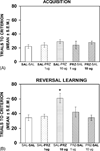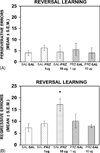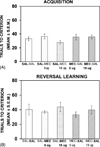Differential effects of M1 muscarinic receptor blockade and nicotinic receptor blockade in the dorsomedial striatum on response reversal learning
- PMID: 15302131
- PMCID: PMC3206590
- DOI: 10.1016/j.bbr.2004.02.011
Differential effects of M1 muscarinic receptor blockade and nicotinic receptor blockade in the dorsomedial striatum on response reversal learning
Abstract
The present studies determined whether blockade of M(1)-like muscarinic or nicotinic cholinergic receptors in the dorsomedial striatum affects acquisition or reversal learning of a response discrimination. Testing occurred in a modified cross-maze across two consecutive sessions. In the acquisition phase, a rat learned to turn to the left or to the right. In the reversal learning phase, a rat learned to turn in the opposite direction as required during acquisition. Experiment 1 investigated the effects of the M(1)-like muscarinic receptor antagonist, pirenzepine infused into the dorsomedial striatum on acquisition and reversal learning. Experiment 2 examined the effects of the nicotinic cholinergic antagonist, mecamylamine injected into the dorsomedial striatum on acquisition and reversal learning. Bilateral injections of pirenzepine at 10 microg, but not 1 microg, selectively impaired reversal learning. Analysis of the errors indicated that pirenzepine treatment did not impair the initial shift, but increased reversions back to the original response choice following the initial shift. Bilateral injections of mecamylamine, 6 or 18 microg, did not affect acquisition or reversal learning. The results suggest that activation of M(1) muscarinic cholinergic receptors, but not nicotinic cholinergic receptors, in the dorsomedial striatum is important for facilitating the flexible shifting of response patterns.
Figures





Similar articles
-
Involvement of the dorsomedial striatum in behavioral flexibility: role of muscarinic cholinergic receptors.Brain Res. 2002 Oct 25;953(1-2):205-14. doi: 10.1016/s0006-8993(02)03287-0. Brain Res. 2002. PMID: 12384254
-
Differential involvement of M1-type and M4-type muscarinic cholinergic receptors in the dorsomedial striatum in task switching.Neurobiol Learn Mem. 2008 Feb;89(2):114-24. doi: 10.1016/j.nlm.2007.06.005. Epub 2007 Aug 20. Neurobiol Learn Mem. 2008. PMID: 17709264 Free PMC article.
-
The influence of NMDA receptors in the dorsomedial striatum on response reversal learning.Neurobiol Learn Mem. 2004 Sep;82(2):81-9. doi: 10.1016/j.nlm.2004.04.004. Neurobiol Learn Mem. 2004. PMID: 15341793
-
The effect of N-methyl-D-aspartate receptor blockade on acetylcholine efflux in the dorsomedial striatum during response reversal learning.Neuroscience. 2006 Dec;143(3):671-8. doi: 10.1016/j.neuroscience.2006.08.024. Epub 2006 Sep 26. Neuroscience. 2006. PMID: 17000053 Free PMC article.
-
Acetylcholine actions in the dorsomedial striatum support the flexible shifting of response patterns.Neurobiol Learn Mem. 2003 Nov;80(3):257-67. doi: 10.1016/s1074-7427(03)00077-7. Neurobiol Learn Mem. 2003. PMID: 14521868 Review.
Cited by
-
Place vs. Response Learning: History, Controversy, and Neurobiology.Front Behav Neurosci. 2021 Feb 11;14:598570. doi: 10.3389/fnbeh.2020.598570. eCollection 2020. Front Behav Neurosci. 2021. PMID: 33643005 Free PMC article.
-
Re-thinking the role of the dorsal striatum in egocentric/response strategy.Front Behav Neurosci. 2010 Feb 26;4:7. doi: 10.3389/neuro.08.007.2010. eCollection 2010. Front Behav Neurosci. 2010. PMID: 20204137 Free PMC article.
-
Striatal Cholinergic Interneurons Are Required for Contending Strategy Selection While Solving Spatial Navigation Problems.J Neurosci. 2022 Feb 16;42(7):1303-1315. doi: 10.1523/JNEUROSCI.1130-21.2021. Epub 2021 Dec 21. J Neurosci. 2022. PMID: 34933954 Free PMC article.
-
Oxotremorine treatment reduces repetitive behaviors in BTBR T+ tf/J mice.Front Synaptic Neurosci. 2014 Aug 13;6:17. doi: 10.3389/fnsyn.2014.00017. eCollection 2014. Front Synaptic Neurosci. 2014. PMID: 25165445 Free PMC article.
-
Contralateral disconnection of the rat prelimbic cortex and dorsomedial striatum impairs cue-guided behavioral switching.Learn Mem. 2014 Jul 15;21(8):368-79. doi: 10.1101/lm.034819.114. Print 2014 Aug. Learn Mem. 2014. PMID: 25028395 Free PMC article.
References
-
- Alcantara AA, Mrzljak L, Jakab RL, Levey AI, Hersch SM, Goldman-Rakic PS. Muscarinic m1 and m2 receptor proteins in local circuit and projection neurons of the primate striatum: anatomical evidence for cholinergic modulation of glutamatergic prefronto-striatal pathways. J Comp Neurol. 2001;434:445–460. - PubMed
-
- Bedard MA, Pillon B, Dubois B, Duchesne N, Masson H, Agid Y. Acute and long-term administration of anticholinergics in Parkinson’s disease: specific effects on the subcortico-frontal syndrome. Brain Cogn. 1999;40:289–313. - PubMed
-
- Bolam JP, Ingham CA, Smith AD. The section-Golgi-impregnation procedure. 3. Combination of Golgi impregnation with enzyme histochemistry and electron microscopy to characterize acetylcholinesterase-containing neurons in the rat neostriatum. Neuroscience. 1984;12:687–709. - PubMed
-
- Brown RW, Beale KS, Frye GDJ. Mecamylamine blocks enhancement of reference memory but not working memory produced by post-training injection of nicotine in rats tested on the radial arm maze. Behav Brain Res. 2002;134:259–265. - PubMed
-
- Calabresi P, Centonze D, Gubellini P, Pisani A, Bernardi G. Endogenous ACh enhances striatal NMDA-responses via M1-like muscarinic receptors and PKC activation. Eur J Neurosci. 1998;10:2887–2895. - PubMed
Publication types
MeSH terms
Substances
Grants and funding
LinkOut - more resources
Full Text Sources

